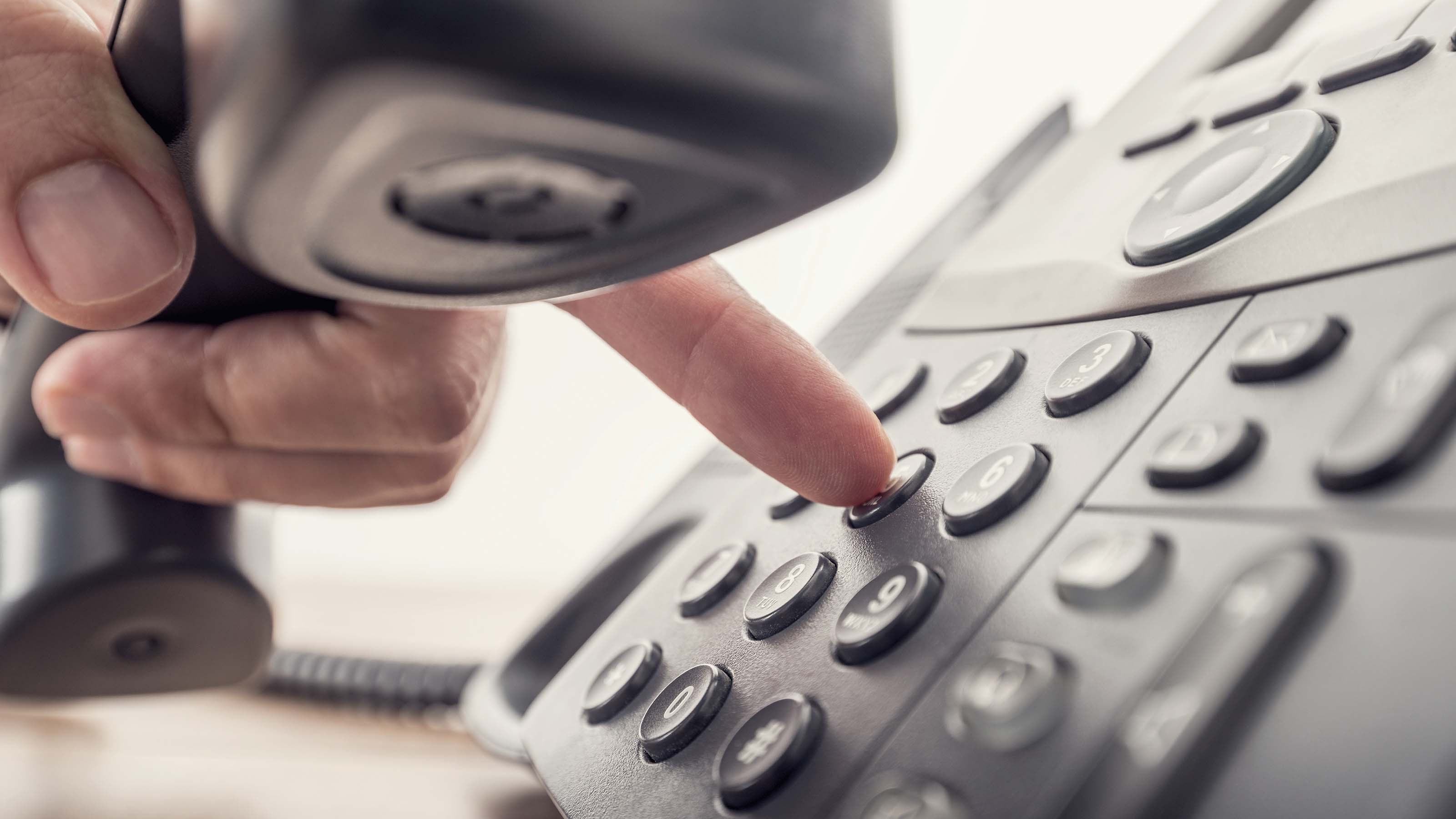Sponsor Content Created With BT
How will the digital switchover benefit small businesses?
Small businesses are setting themselves up for future success by getting up to speed with the digital switchover – here's everything you need to know

The phone network – the public switched telephone network (PSTN), as it is known more generally – is on its way out. In its place is coming a newer, shinier version based on the internet.
This represents a big, national move to digital - also known as the digital switchover - in which communications giant Openreach is replacing the legacy copper cabling system with a modern and flexible digital phone network. Do you remember or have you heard about analog TVs being replaced with modern digital counterparts? It’s not too different in this case, although it will have a bigger impact on the business world than upgraded TV broadcasts, particularly for smaller firms.
Every phone line in the UK will communicate over a digital network, and businesses are being encouraged to migrate away from the existing, aging network to an all-internet-based system by the end of this year. That's to ensure the services they provide as a small business aren't disrupted ahead of a full final shutdown of the legacy network in January 2027.
Once your small business migrates, all voice calls will be transmitted through an internet connection – but it's so much more than that. When making the switchover with BT, you can unlock doors to so many possibilities that simply weren't at your disposal before – from better security to faster speeds.
Don't lag behind – the time to act is now. The benefits of digital await those who move now, whereas businesses that wait until 2026 or closer to the 2027 deadline stand to lose out. That's because their rivals will reap the rewards early and build a much better proposition for their customers.
Why are small businesses being affected by the digital switchover?
Many small businesses use a variety of systems for day-to-day operations. Phones are used by them all, but in some sectors, such as legal, fax machines also continue to play a business-critical role.
Voice calls will be affected, but so will any device that relies on the old copper system. These include phones, CCTV, and electronic point of sales (EPOS) systems like card payment machines. The digital switchover could even affect lift alarms – it depends on how reliant these systems are on the current network. In these cases, small businesses are advised to check with their provider to ensure they will still work once the switchover has taken place.
What are the benefits of switching over?
The switch from the old to the new is more than just a technicality – it's necessary to keep business phones working. It also helps small businesses better access the full benefits of the cloud, as well as the full range of tools and services that come with it. Many smaller businesses have already embraced this new way of making calls, but those who haven't yet made the switch may wonder what the wider benefits are.
Dartmoor Zoo is a good example of a small business that has embraced new technologies to help support current and future needs.
BT installed two fiber-optic broadband lines to boost connectivity speeds and coverage across the zoo’s 33 acres. The zoo also opted for BT Cloud Voice - a VoIP solution - so that staff can be easily contacted on their own devices, rather than using handheld radios as they did previously.
“Technology is absolutely a key element of ensuring that our teams are able to work effectively wherever they are,” says David Gibson, CEO at Dartmoor Zoo.
By embracing the new digital infrastructure, small businesses can future-proof themselves. And that’s exactly what Dartmoor Zoo has done, according to Gibson.
“We have a ten-year master plan,” he adds. “There’s going to be big changes… That means we need to be efficient, we need to be agile, and we need to be future-proof.”
Small businesses can also use the newer network to deliver more flexibility – unlocking new opportunities to scale and raise productivity levels. Your small business could, like Dartmoor Zoo, take calls on any device, no matter where it is, all using the same phone number. Business apps can also be linked with video chat, calls, and collaboration software. With everything based in the cloud, small businesses can now access logs and recordings from any system, anytime.
Investing in this system also allows companies to scale up as and when they need, with greater flexibility as they grow. This is perfect for start-ups, but also small businesses that may want to expand in the future.
BT offers a range of packages to suit the needs of every small business, spanning the number of users, internet speeds, and extra features – ensuring that you only pay what you need while always having the option to grow.
What steps can you take to switch over?
Not all small businesses will be set up the same, but there are some basic steps you can take to make sure you're on the right footing.
The best place to start is by taking stock of the devices you've got – and then determining how important these systems are. What would be the effect if they just stopped working? That's what you'll need to consider if they're analog in nature and aren't going to work post-switchover. You should also think carefully about which benefits your business would like to tap into now, as well as later down the line.
By following a few simple steps, your business will then be primed to make the switchover with the help of BT. The company offers a range of equipment for small businesses that will truly allow them to tap into the advantages of the digital switchover.
But remember, you must make sure your internet connection speeds are fast enough to support voice over IP (VoIP). To make things simpler, you can call BT Business to chat with a member of the team to help better understand your existing setup, as well as which options would be best suited to your specific needs.
Businesses that’ve already made the switch to digital are in a much better position than they were before. Take estate agent John Hilton as another example of this in action. Being available via the phone or email is critical to the work its team does.
“We decided to switch over to IP technology fairly early on to try and future-proof the business, ...We can work anywhere. We can work from home as long as we’ve got an internet point. It’s definitely given us flexibility and more efficiency within the business,” says Marius Foster, the company’s director.
“Support from BT is a big weight off your shoulders,” he adds. “It gives you peace of mind.”
The final deadline for deadlines is 2027 – but small businesses should take necessary steps to migrate by December 2025. Thankfully, that's where BT steps in. For organizations that are struggling to pick out where to start, you should reach out to BT to speak with one of our experts to kickstart your journey. Here's a breakdown of the three key steps that you will follow:
- Give us a call and we'll run through your options, as well as answer any of the questions you have.
- We'll discuss your migration plan by providing a digital solution that is designed to support your business priorities.
- Once you're happy, we'll book in your installation dates so you can ensure work carries on as normal.
If you’re a small business looking to make sense of the digital switchover and see how your business can benefit, visit BT’s small business digital switchover site for more information.
Sign up today and you will receive a free copy of our Future Focus 2025 report - the leading guidance on AI, cybersecurity and other IT challenges as per 700+ senior executives
ITPro is a global business technology website providing the latest news, analysis, and business insight for IT decision-makers. Whether it's cyber security, cloud computing, IT infrastructure, or business strategy, we aim to equip leaders with the data they need to make informed IT investments.
For regular updates delivered to your inbox and social feeds, be sure to sign up to our daily newsletter and follow on us LinkedIn and Twitter.
-
 The move to a digital network and its role in the bigger picture of achieving true digital transformation: how SMBs can set themselves up for success
The move to a digital network and its role in the bigger picture of achieving true digital transformation: how SMBs can set themselves up for successSupported Beyond the dial tone, the digital switchover is the key to SMB success
-
 What exactly is IP, and why does it matter right now?
What exactly is IP, and why does it matter right now?Supported The future is calling: IP really will be a lifeline for small businesses...
-
 The analogue to digital switchover affects way more than landlines: Why small businesses need to take action now
The analogue to digital switchover affects way more than landlines: Why small businesses need to take action nowSupported The shift away from PSTN is about more than just new tech – sticking with the old system is not an option
-
 What is the digital switchover, and why does it matter to small businesses?
What is the digital switchover, and why does it matter to small businesses?Supported Adopting IP systems reduces costs and unlocks new innovation
-
 Is your small business ready for the move to digital? Key considerations and actions you need to take today
Is your small business ready for the move to digital? Key considerations and actions you need to take todaySupported From an initial plan to a full digital service, here is everything you need to know about the digital switch to an all-IP business



